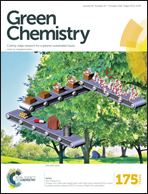Biodegradable tough waterborne hyperbranched polyester/carbon dot nanocomposite: approach towards an eco-friendly material†
Abstract
In this study, environmentally friendly waterborne hyperbranched polyester/carbon dot (CD) nanocomposites were fabricated by in situ polymerization through a facile and greener route in the absence of catalyst, solvent and neutralizing agents. Three nanocomposites were prepared at different loadings of CD (0.1, 0.5 and 1 wt%). The CDs were prepared from citric acid and glycerol in the presence of cost-free cow urine through a greener one step method. The structural attributes of the nanocomposites were evaluated by transmission electron microscopy, X-ray diffraction, Fourier transform infrared and UV-visible spectroscopic studies. The thermosets were obtained by curing the polyester nanocomposites with glycerol-based hyperbranched epoxy and fatty acid based poly(amido amine) hardener. The nanocomposites exhibited excellent wavelength dependent down-conversion and up-conversion fluorescence properties. The significant improvements in mechanical properties like tensile strength (7.8–47 MPa), Young's modulus (243–745 MPa), toughness (17.82–51.1 MJ m−3) and scratch hardness (4–10 kg) were observed for the thermoset nanocomposites. Thermogravimetric analysis supports high thermostability (234–265 °C) while differential scanning calorimetry authenticated a glass transition temperature in the range of 49 to 56 °C. The rheological study demonstrated shear thinning behavior. The nanocomposite films exhibited good transparency in the visible range. Furthermore, thermoset nanocomposites were found to be highly biodegradable by Bacillus subtilis and Pseudomonas aeruginosa bacterial strains. The nanocomposite also possessed efficient self-cleaning abilities as observed by the photodegradation of formaldehyde (within 7 h) and methylene blue (80 min) under exposure from normal sunlight. Thus, this nanocomposite could be used as a promising eco-friendly material for advanced applications.


 Please wait while we load your content...
Please wait while we load your content...